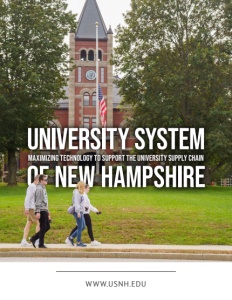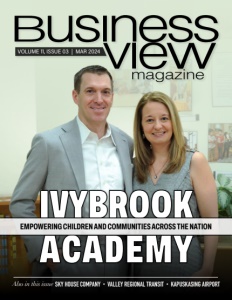University System of New Hampshire
MAXIMIZING TECHNOLOGY TO SUPPORT THE UNIVERSITY SUPPLY CHAIN
Providing undisputable expertise with the experience to match in higher education procurement
New Hampshire undoubtedly boasts some enviable natural assets. However, what it also provides its residents goes beyond historical charms and points to some of the leading institutions based in the state that offer premier educational/career opportunities that prepare young talent to enter the New Hampshire workforce. At the forefront of public higher education in New Hampshire stand three distinguished institutions: the University of New Hampshire (UNH), Plymouth State University (PSU), and Keene State College (KSC).
Josh Dubroff, Chief Procurement Officer, ensures the smooth functioning of source-to-pay within the University System of New Hampshire (USNH). With nearly two decades of experience in higher education procurement, Dubroff offers invaluable insights into the procurement and supply chain management practices that drive operational efficiency and innovation within the institutions. His expertise sheds light on the intricate mechanisms fueling the success of USNH.
Dubroff constantly refers back to the core mission, “As we continue to innovate and optimize procurement processes, the goal remains steadfast: to support the faculty, students, and staff in achieving their objectives with maximum efficiency and effectiveness. We’re committed to driving positive change and delivering exceptional value for the entire university system community.”
Before exploring the specifics of procurement, it’s essential to understand the historical context in which USNH operates. Established with a focus on delivering high-quality education, these institutions consistently lead in academic innovation and community engagement in addition to being proven standard-bearers in research efforts, sustainability and in providing top-tier liberal arts and STEM offerings that equip future leaders who will drive the NH economy and contribute widely to their communities.
In addition to the procurement transformation, USNH underwent a significant finance restructuring over the last several years aimed at reducing cost, streamlining processes and shifting the limited resources of the institutions to best support core activities. Each entity within USNH brings its unique strengths to the collective.
Academic operations
However, the landscape of higher education is rapidly advancing, necessitating strategic adaptation and collaboration. The recent merger of Granite State College online into UNH exemplifies the commitment to optimizing resources and assets to enhance accessibility for students nationwide.
“This consolidation streamlines administrative processes and fosters a more cohesive academic experience for learners.” Dubroff notes,
Within this dynamic environment, the role of procurement cannot be overstated. Procurement plays a crucial role in supporting research, teaching and operations by facilitating the acquisition of goods and services essential to the educational mission. Every aspect of the institutional functioning relies on a well-oiled supply chain, from sourcing textbooks and laboratory equipment to facility maintenance contracts and enterprise software solutions.
Dubroff notes “You have to make sure that processes are as streamlined and dialed in as possible so that departments across USNH can achieve their respective missions and don’t feel like they need those extra resources in their departments to do manual work that can be automated with technology.”
Moreover, procurement practices must continually evolve to meet emerging challenges in an era of technological advancements and global interconnectedness. Whether navigating supply chain disruptions or leveraging data analytics to optimize purchasing decisions, USNH leads procurement innovation.
Dubroff highlights the importance of recruiting and retaining talent across the source-to-pay teams as an essential ingredient for success, noting that it’s the team that makes technology and processes work and not the other way around.
Procurement and supply chain management
The focal point of USNH’s procurement strategy is optimizing a shared services organization dedicated to serving the diverse needs of the campuses. The centralized approach consolidates resources, expertise, and purchasing power, enabling it to leverage economies of scale and negotiate favorable terms with suppliers.
Dubroff emphasizes the importance of a data-first culture and strategy across the procurement organization that combines standard reports, visualizations, Benchmarks/KPIs, and detailed analysis to improve every area of the organization from customer service to change management, as well as more traditional applications such as strategic sourcing. These solutions can be complemented with staff expertise and solutions such as Jupyter Notebook, Python, and various Python Libraries for advanced analysis including natural language processing to gain insights from unstructured data.
Aligning procurement efforts across the entire enterprise can simplify processes, cut administrative costs, and get the most value from every dollar spent. Strategic sourcing is crucial to this approach, involving collaborative identification of procurement opportunities, rigorous vendor selection, and ongoing contract management. These initiatives help USNH enhance supplier relationships, manage supply chain risks, and save costs while maintaining quality and service standards.

Procurement transformation
USNH has embraced technological innovation as a catalyst for procurement transformation. The adoption of the Jaggaer procurement platform exemplifies the commitment to modernizing procurement processes and enhancing user experience. Leveraging digital tools and automation can expedite requisition processing, streamline purchase order creation, and facilitate electronic invoicing, reducing manual intervention and accelerating transaction cycles.
The journey towards procurement quality is not without its challenges. As Dubroff aptly points out, the complexity of streamlining procurement processes necessitates a multifaceted approach that accounts for diverse stakeholder needs, organizational structures, and technological capabilities. Balancing the need for centralized oversight with the autonomy of individual departments requires careful coordination, communication, and change management.
In this evolving landscape of higher education, procurement remains a cornerstone of institutional success. By embracing innovation, collaboration, and strategic thinking, USNH is prepared to not only meet the challenges of today but also anticipate and adapt to tomorrow’s opportunities.
USNH has begun using generative AI capabilities to expedite the speed of RFx creation while also increasing the completeness and quality of RFx documents. This process also seeks to enhance support for its internal customers by providing them with draft documents to edit instead of starting from scratch in developing documents that they may not be familiar with or use on a frequent basis. “As we continue to explore use cases for generative AI, we will be able to provide a higher level of service and support for our internal stakeholders while also increasing efficiency and effectiveness.”
The Jaggaer Platform and PaymentWorks
Dubroff elaborates on the procurement processes at the University System of New Hampshire, emphasizing the institution’s dedication to boosting efficiency, transparency, and value throughout its supply chain. By using technologies like the Jaggaer platform and PaymentWorks, USNH has transformed its procurement operations, leading to automation, smoother workflows, and risk reduction.
The Jaggaer platform serves as the linchpin of USNH’s procurement ecosystem, offering a comprehensive suite of tools for strategic sourcing, contract management, e-procurement, and accounts payable. USNH can effectively manage supplier relationships, optimize purchasing decisions, and ensure compliance with regulatory requirements through integration with the ERP system and advanced features such as Contracts AI.
“Jaggaer gives us the ability to streamline and automate our end-to-end processes, creating visibility that allows us to identify and solve problems effectively,” Dubroff notes.
Similarly, PaymentWorks has been adopted for the supplier onboarding process, providing a seamless and secure means of validating payees, managing tax information, and mitigating risk. By automating supplier verification and due diligence, USNH can minimize fraud, enhance data accuracy, and expedite transaction processing.
Integration with Workday
According to Dubroff, the transformation at USNH goes beyond procurement. It will augment broader organizational changes and enterprise-wide technology implementations, including adopting Workday, the new ERP system for Finance/HR/Student systems which will continue to transform the entire organization. The integration of procurement technology and processes with finance, HR, and student systems aims to streamline operations further, improve data visibility, and promote collaboration across functions.
Robert Steele, Workday Group Vice President of State/Local Government and Higher Education adds, “At Workday, we’re proud to be the chosen partner for USNH. Our success starts with our customers’ success, and we are honored to provide procurement solutions within our unified enterprise management cloud platform to streamline operations, surface better stakeholder collaboration, and leverage data and insights to help support USNH’s strategic goals system-wide.”
“At Workday, our relationships with our customers goes beyond technology – we are committed to helping our customers maximize our solutions to see value realized,” Steele elaborates.
Transparency, compliance, and mitigation
Amidst the pursuit of efficiency and value, USNH prioritizes managing risks in procurement. As a public organization, transparency, fairness, and compliance are crucial in selecting suppliers and negotiating contracts. USNH works to reduce risks like fraud, compliance issues, and supply chain disruptions through due diligence, alignment with stakeholders, and continuous supplier monitoring.
Dubroff promotes how the University System of New Hampshire uses artificial intelligence (AI) and machine learning (ML) to improve its procurement operations. He highlights several AI-driven initiatives to boost efficiency, accuracy, and stakeholder satisfaction.
One of the applications of AI/ML at USNH is within the Jaggaer platform where machine learning algorithms are employed to automate manual processes and streamline workflow. For instance, the Digital Capture feature utilizes OCR technology to scan and extract information from invoices, facilitating rapid processing and matching with purchase orders. This has significantly reduced the time and effort required for invoice management, leading to expedited transaction processing and enhanced data accuracy.

The power of AI technology
Additionally, USNH is in the process of implementing a Contracts AI solution within the Jaggaer platform. This innovative tool leverages AI algorithms to analyze contract documents, identify key clauses, and compare them with predefined terms.
USNH can mitigate risks, ensure compliance, and expedite contract approval processes by automating the review and validation of contract terms and conditions. This represents a significant advancement in contract management efficiency and risk mitigation capabilities.
USNH has integrated AI-powered chatbots into its procurement processes to facilitate communication and information retrieval. These chatbots utilize natural language processing (NLP) algorithms to understand user queries and provide relevant responses or resources. By leveraging AI-driven chatbots, USNH aims to enhance user experience, accelerate information access, and improve efficiency in procurement-related interactions.
The future of procurement at USNH
USNH’s embrace of AI underscores its dedication to using advanced solutions for better procurement. Using AI, USNH seeks to improve efficiency, accuracy, and stakeholder satisfaction while managing risks and meeting regulations. With AI’s ongoing development, USNH is ready to seize new opportunities for innovation and effectiveness in procurement.
Dubroff emphasizes the importance of optimization, streamlining, and risk mitigation in supply chain management, affirming the University System of New Hampshire’s commitment to these principles. He expresses confidence in the organization’s direction and anticipates positive outcomes from their efforts to enhance efficiency and manage risk effectively.
Strategic sourcing will continue to grow in importance for the organization. USNH’s strategic sourcing approach focuses on proactive market analysis, stakeholder engagement, and ongoing improvement. USNH can manage spending more effectively, save costs, and strengthen operational resilience by systematically identifying procurement opportunities, assessing supplier capabilities, and negotiating favorable contracts.
AT A GLANCE
University System of New Hampshire (USNH)
What: Integrating technological solutions and AI-driven initiatives to streamline procurement processes for academic success with USNH.
Where: Higher education landscape of New Hampshire.
Website: https://www.usnh.edu/
PREFERRED VENDORS
Workday – www.workday.com
Workday is a leading enterprise platform that helps organizations manage their most important assets – their people and money. The Workday platform is built with AI at the core to help customers elevate people, supercharge work, and move their business forever forward. Workday is used by more than 10,000 organizations around the world and across industries – from medium-sized businesses to more than 50% of the Fortune 500. For more information about Workday, visit workday.com.







